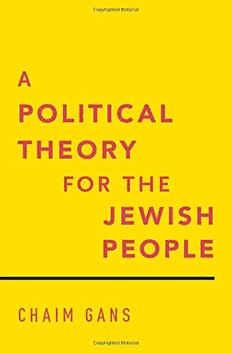
A political theory for the Jewish people PDF
Preview A political theory for the Jewish people
A POLITICAL THEORY FOR THE JEWISH PEOPLE A POLITICAL THEORY FOR THE JEWISH PEOPLE CHAIM GANS 1 1 Oxford University Press is a department of the University of Oxford. It furthers the University’s objective of excellence in research, scholarship, and education by publishing worldwide. Oxford is a registered trade mark of Oxford University Press in the UK and in certain other countries Published in the United States of America by Oxford University Press 198 Madison Avenue, New York, NY 10016, United States of America © Oxford University Press 2016 All rights reserved. No part of this publication may be reproduced, stored in a retrieval system, or transmitted, in any form or by any means, without the prior permission in writing of Oxford University Press, or as expressly permitted by law, by license, or under terms agreed with the appropriate reproduction rights organization. Inquiries concerning reproduction outside the scope of the above should be sent to the Rights Department, Oxford University Press, at the address above. You must not circulate this work in any other form and you must impose this same condition on any acquirer. Cataloging-in-Publication data is on file at the Library of Congress ISBN 978–0–19–023754–7 1 3 5 7 9 8 6 4 2 Printed in the United States of America on acid-free paper To the memory of my parents Anshel and Yehudit Gans CONTENTS Preface ix 1. ZIONISMS AND POST-ZIONISMS 1 1.1. A Variety of Approaches 1 1.2. The Post-Zionist Challenge 8 1.3. The Narrative versus Its Interpretations 15 2. THE FACTS OF THE ZIONIST NARRATIVE 20 2.1. Was There a Protagonist? 20 2.2. The Protagonist, Its Age, and Its Nature 22 2.3. The Protagonist’s Adventures 43 3. THE MORALITY OF THE ZIONIST NARRATIVE 57 3.1. Three Zionisms 57 3.2. Proprietary Zionism 60 3.3. Hierarchical Zionism 72 3.4. Egalitarian Zionism 83 4. THREE POST-ZIONISMS 102 4.1. Between Hegemony and Post-Zionism 102 4.2. Contesting Zionism’s Historical Project 104 4.3. Civic Post-Zionism 111 4.4. Postcolonial Post-Zionism 118 4.5. Neodiasporic Post-Zionism 127 5. EGALITARIAN ZIONISM 141 5.1. Egalitarian Zionism and Its Rivals 141 5.2. Zionist Consistency and Historiography 142 5.3. Zionisms, Post-Zionisms, and Peace in Israel/Palestine 153 6. JEWISH NATIONALISM, ISRAEL, AND WORLD JEWRY 170 6.1. World Jewry: Exile or Diaspora? 170 6.2. Proprietary Zionism: Negation of Exile and Denial of Diaspora 173 6.3. Post-Zionism: Denial of both Exile and Diaspora 186 6.4. Egalitarian Zionism: Negation of Exile and Affirmation of Diaspora 199 Afterword 219 Notes 231 Bibliography 277 Index 291 PREFACE The title of this book is ambitious, and perhaps so also is the book itself—not only in its purpose, but also in the breadth of the spheres within which it argues and the range of its adversaries. The book argues both foundationally and in an applicative manner within the spheres of historiography, history of ideas, analytic political morality, and consti- tutional theory. It has both normative and explanatory components. Its adversaries are mainstream Israeli Zionism on the one hand and Israeli and Anglo-American-Jewish post-Zionism on the other. The latter’s crit- icisms of Zionism represent also the main Palestinian and Arab depic- tions and criticisms of the Zionist political idea and historical movement. I conceived these ambitions for my book as a result of the way my thinking about Zionism developed. I didn’t intend this ambitiousness when setting out to write the book; it came as a discovery for me, which I was happy to give expression to in the title. In 2008 Oxford University Press published my A Just Zionism: On the Morality of the Jewish State. That book deals mainly with questions concerning the status of the Jewish community constituted by the Zionist movement in historic Palestine / Land of Israel vis-à-vis the status of the Palestinians. Though it was very critical of Israel’s major Zionist policies since the 1970s, it still argued in favor of the Zionist political idea. A Just Zionism presented an inde- pendent, constructive argument, free from polemics. It developed and modified my general ideas on nationalism as elaborated in my book The Limits of Nationalism (Cambridge University Press, 2003) and applied them to the concrete case of Zionism and Israeli nationalism. After the publication of A Just Zionism I had the strong feeling that its theoretical and practical significance could not become fully clear either to myself or, probably, to its readers unless I compared it with other current inter- pretations of the Zionist political idea and historical movement, and the major criticisms of them made by the post-Zionist intellectuals. The latter’s major arguments are of two types. One concerns the social ontol- ogy underlying the factual components of the Zionist narrative, which the post-Zionists claim is necessarily an essentialist social ontology. The other type concerns political morality. Post-Zionist criticisms of the facts of the Zionist narrative (mainly of pre-Zionist Judaism) led me to criti- cize both this historiography itself and its post-Zionist critics, and to
